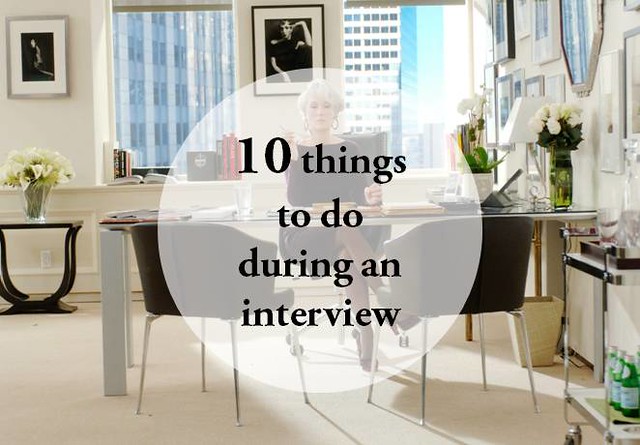
Last week I started a month series around the interview process. In week one I shared Five Things to do Before an Interview. This week I'm sharing 10 things to do During an Interview.
1. Dress Appropriately - if you're going to a formal interview, I'd recommend wearing a blue, black or grey suit. This all depends on who you're meeting with and what type of company. For the corporate world, wear a suit.
2. Bring Your Resume- it's important to bring several copies of your resume. Give your resume to anyone you speak with during the interview. Make sure you have your resume memorized. Make sure you don't use your resume as a crutch. The resume is for those interviewing you, not for you. Keep your eyes off your resume.
3. Always be Professional - As soon as your get on the company's property, act as if anyone could be the CEO or President of the company. Imagine if you got in an elevator with the CEO of a company, unknown to you, and you're on Instagram or you're talking to a friend on the phone really loud. I'd say your chances of getting the job just went down by 60%.
4. Stay off your phone - to go along with the #3, stay off your phone till after the interview. The only reason to check your phone is if you're looking for the address of the company. I'd recommend writing down the address, number and names of those you're meeting with during the interview. It will keep you away from reaching for your phone.
5. Breathe & give yourself a peep talk - it's that easy. Take ten deep breathes and give yourself a peep talk. remind yourself of all your success in the past and that you're the most qualified candidate for the position.
6. Eye contact & body language- this is standard advance, but make sure that you sit up straight, make eye contact and speak clearly. Don't be too stiff. I've noticed that if they offer me a glass of water, I'll take sips of water throughout the interview. It breaks up sitting there for 1+ hour talking across a desk.
7. Answer questions with supportive information- if asked a questions a closed ended questions (yes/no questions), answer the question and then give facts to backup your answer. If asked an opened ended questions (where you have to elaborate on your answer). Answer the question in the first sentence and give supportive information in the next few sentence. Try to not drag on your answers.
8. "Strengths" & "Weakness" question- this is my least favorite question during an interview process, but the most necessary. Make sure you've rehearsed your answers. Don't be thrown off by this simple question. Good examples of strengths, "when put under stressful scenario, I'm able to stay focused and calm and help others during these situations". A good example of a weakness, "I'm competitive in any situation, I always give 110% on any project and this can be exhausting. However I want to know I put my best foot forward."
9. Ask insightful and through questions- this goes back to doing your research. Ask questions about the company's background. Ask the person who's interviewing you about their experience at the company. On thing about these questions is that you should know most of the answers to your own questions. Read about the background of both the company and those who interviewing you prior to interview.
10. Ask about the next steps- this is also known as closing the interview. Ask about the next steps. What happens after this? How many more candidates are you interviewing for this position? If I were to get this position, when would I start? How long does the hiring process typically take from beginning to end? Get the person is interviewing visualize them hiring your for the position. During interview, I also like to give my "closing statement". I give an overview why I think I'm a good fit for the position and flat out tell the person, "I want this position."
One thing to keep in mind, it's important that the person interviewing you is also selling you on the position and the company. As important as these are for the person interview, it's also important for the person who is interviewing you. Keep that in mind. Do you want to work with someone who's on his phone, doesn't make eye contact, asks irrelevant questions? Probably not. Be sure to evaluate the entire process before you decide if the position is right for you.


No comments:
Post a Comment
Thank you for your comments! Olivia